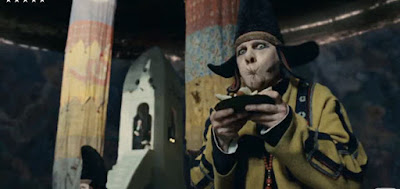First, Do No Harm
or
Physician, Heal Thyself
Now, prolific director Steve Soderbergh, who started his career twenty four years ago with Sex, Lies, and Videotape is saying he will end his commercial film career** with Side Effects, an odd mixing of genres that has as its basis all those little warnings for the mystery "miracle" pills that are being foisted on the public for the slightest of symptoms and moods, with the tentative approval of the FDA, and a library of law-suits, concerning their consequences on real human beings. In that way, it plays on a public's paranoia and trust of just what kind of human experiments might be being financed by the drug cartels, in much the same way as Hitchcock messed with our minds with our basic fears in his long career. Soderbergh has never been this direct in his work before, making something akin to a traditional suspense-thriller, instead of a character study with sociological underpinnings (The Informant!, Contagion, S, L, and V, Traffic) as we're used to from his previous work.
It's a pretty basic story, with some nicely diverting echoes of recent headlines: Emily Taylor (Rooney Mara) works for a New York marketing agency and is dealing with a lot of stress in her life. Her husband (Channing Tatum) is being released from prison after four years for insider trading. She's been struggling with these issues for awhile, and being treated for depression over the circumstances. But, once husband comes home, things take a turn for the worst.
Or actually, don't take a turn—Emily drives her late-model car directly into a garage wall—rather than heading for the "Exit" arrow, she runs INTO the "Exit" arrow.
The screenwriter is Scott Z. Burns (who also wrote Contagion and The Informant!) and he's constructed a medical thriller that takes a few hairpin turns and manages to avoid the guardrails of audience expectations and movie cliches. And Soderbergh (who shot and edited the film) has cast it impeccably with folks he's worked with before: Law, who's usually fared better at smaller character parts, here finally shows he can carry off a "leading man" role, dominating the film, while making "normal" interesting; Catherine Zeta-Jones shows (again) how versatile she can be in a small but crucial role as a consulting shrink; Channing Tatum makes the most of his part as the husband caught up in a world that he's just re-entered but can't understand. And Soderbergh rookie Rooney Mara gives a complex performance that's more than a little unpredictable (not surprising, given her history of moving from a straight performance in The Social Network to anything-but in Fincher's version of The Girl with the Dragon Tattoo) looking like what you'd imagine Sandra Bullock's creepy little sister might look like, Mara convincingly pulls off mood shifts that might require an exorcist rather than a prescription.
In any case, in the theater or after-movie discussions, Side Effects will not cause drowsiness.
 |
| Jude Law learns his practice isn't perfect in Side Effects |































 But Gilliam's Devil is in the details.
But Gilliam's Devil is in the details. 


.jpg)

.jpg)








